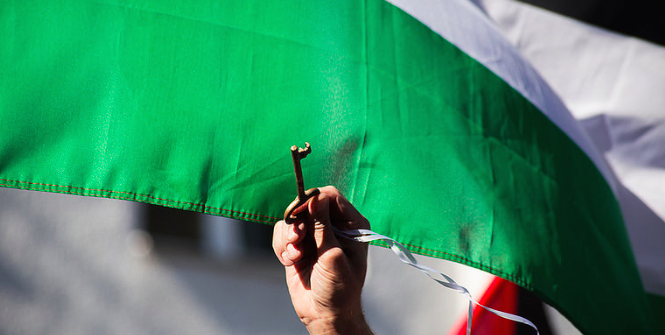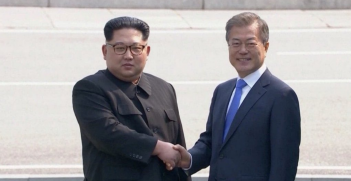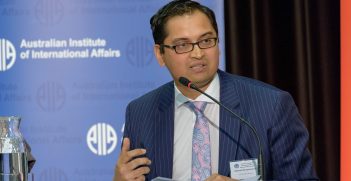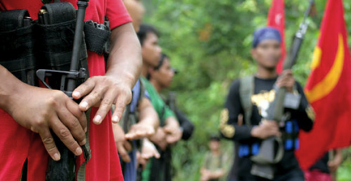Creating a Palestinian State

Much of the world endorses a two-state solution. Why haven’t we moved to the next step? It is time for world leaders to move beyond declarations, and to walk their talk.
For those of us who keep a close eye on the international community’s response to the Israel-Palestine conflict, it was somewhat of a puzzle to watch media outlets and NGOs recently express surprise — some giddy, some with alarm — that Pope Francis would recognise a Palestinian state, as he did last month.
I am not sure why the Pope’s announcement caught so many off guard or prompted such hopeful remarks, especially as George W. Bush was among the first Western leaders to have made this commitment close to a decade ago now. Countless leaders — from Stephen Harper and Barack Obama to heads of state throughout Latin America and Europe — have either explicitly endorsed a Palestinian state, or, sometimes more subtly as in Harper’s case, claimed to support a “two-state solution.”
One does have to ask — why don’t any of these endorsements bring us any closer to a non-violent resolution to the conflict? And, assuming a two-state solution recognises both an Israeli and Palestinian state, what would the latter look like?
The road to here
Certainly, the journey to this point has been long and not in the least insignificant. In May 1988, the Palestinian Liberation Organisation (PLO) more or less officially renounced its one-state platform for a two-state solution with its Declaration of Independence. At the time, most people (even those who were interested in the conflict) paid little attention to this momentous decision but it had local as well as international consequences.
It was with this declaration in hand, so to speak, that Yasser Arafat and the PLO leadership in 1993 could sign the Oslo Peace Accords, which were (it was said at the time) to be the basis not only for the demilitarisation of the conflict but for a stepped process to resolving the conflict, with Jerusalem and refugee issues to be negotiated in future.
The Oslo Accords meant the beginnings of a process that opened up Israel’s relationship with much of the rest of the Arab World (which had embargoed the former), allowing for diplomatic relations to be extended with Jordan and Morocco, among others. Lebanon and Syria were to remain official enemies, in large part because territorial disputes had yet to be settled.
While the Oslo Peace Accords opened the way to official dialogue with and among Palestinians and Israelis, and while Gaza, Jericho and a few other major Palestinian towns were officially “liberated” from direct military rule by Israel, the building of West Bank settlements continued apace (actually enlarging both in scope and territory). New settlements led only to greater economic as well as human insecurity for the Palestinians living under indirect security “arrangements” with Israel as well as those continuing to live under direct military rule.
Two states, two one-sided narratives
Throughout the decades, as Israel sought to reinforce the ideology and geography of its own state, it became ever more defence-oriented, most recently building a controversial security fence ostensibly to keep suicide bombers from entering what it had drawn as its borders (mostly but not entirely along the 1967 ceasefire lines). Meanwhile, much of the Palestinian labour force that Israelis had relied upon from the West Bank as cheap and precarious was replaced by migrant workers from Romania, Philippines, West Africa, and China.
And still, the conflict became ever more violent, and the lives of Palestinians ever more insecure, with higher rates of unemployment and poverty, water and food shortages, and even a rise in preventable diseases. These effects were coupled not only with the unruliness and corruption of some members of the Palestine Authority, but with an increasing realisation that the “peace talks” with Israel had failed to alter any “facts on the ground” (as the Israelis like to call it). These failures led to the rise of political opposition and to fill the vacuum of power across all of Palestine. The insecurities of Israelis also increased, as Palestinians took to militarizing their efforts in their resistance to Israel.
Slowly, then, as the politics of national defence and security came to dominate discourse on the Israeli side, leading voices for peaceful negotiations began to lose ground. A rhetoric grounded not in reality but in politics — “we have done everything we can and they will not take what we have offered them” and bumper stickers stating “No Arabs, No Peace” — led to the rise of more militant voices and movements.
Radicals on both sides began to mirror one another’s rhetoric — “there is no one left to talk to.” On the Israeli side, this statement meant that even with power on their side, they could not get the Palestinians to accede to their will. Meanwhile, the Palestinian perspective was that there was much too little on the table that was going to be acceptable to the wide majority of Palestinians living under direct and indirect Israeli rule.
The importance of a ‘state’
Each has, of course, their own narrative but I have tried to capture here a little of what matters; and with the declaration of a state, what matters is that both Palestinians and Israelis each have a future to live in peace and with security, and to determine their own futures.
Declarations of a state can be meaningful only if the living conditions of those to whom such declarations apply can be changed.
So, what does the Pope’s (and others’) statement really mean for Palestinians?
On the one hand, it means that their plight has been formally recognised. In this regard, it may give Palestinians enough hope to continue to stand by their commitment to a two-state resolution of the conflict. It may also put pressure on other governments to make their official policies — in most of the West, including Canada, the U.S. and the UK, this means a two-state resolution — meaningful to those living in the region.
All of the states that have made such declarations have done so on grounds that any resolution meet the minimums set out in UN Resolution 242. Israel’s official position — its official foreign policy position is also a two-state position — may be lost on those who are simply exposed to the rhetoric.
Canadians may find it surprising to learn, given our own government’s recent rhetoric, that the Harper government has also committed to a two-state solution, regards settlement policy under military occupation to be an abrogation of international law, and has long-called for Israel to recognise the self-determination of the Palestinians.
Declarations of a Palestinian state — or any state at all — are meaningful only when other forms of systemic and structural power are accorded to those states. Palestine’s recent membership into the International Criminal Court can be considered one of the first concrete steps towards meaningful international recognition. Recognition of Palestinian citizenship, in addition to passports, and foreign policies aimed at developing stronger economic partnerships that would include trade with Palestinians and development aid to Palestine, would all move statehood a few steps forward.
In its partition plan of 1947, the UN too declared there would be a Jewish and an Arab state, living side by side. For the Palestinians, this was the point of no return. For some European Jews, especially in the context of a post-Holocaust world, this was the sign of a new beginning.
Yet, nearly 70 years later, we continue to perceive the acknowledgement of two states as something new and significant. We should not wait for new declarations so much as insist that there be the practical application of all those that came before, as guided by international law, humanitarianism, and the laws of state. Canada has a long tradition of promoting the development of those practices that enhance peace, development and human security. Implementing such policies can lead to change from within as well as across communities involved in violent conflict, in its direct as well as “low-intensity” forms.
It is time for world leaders to move beyond declarations, and to walk their talk.
Jasmin Habib is an Associate Professor at the Balsillie School of International Affairs and the Department of Political Science at the University of Waterloo. This article was originally published on the Canadian International Council’s OpenCanada blog on June 8, 2015. It is republished with permission.





